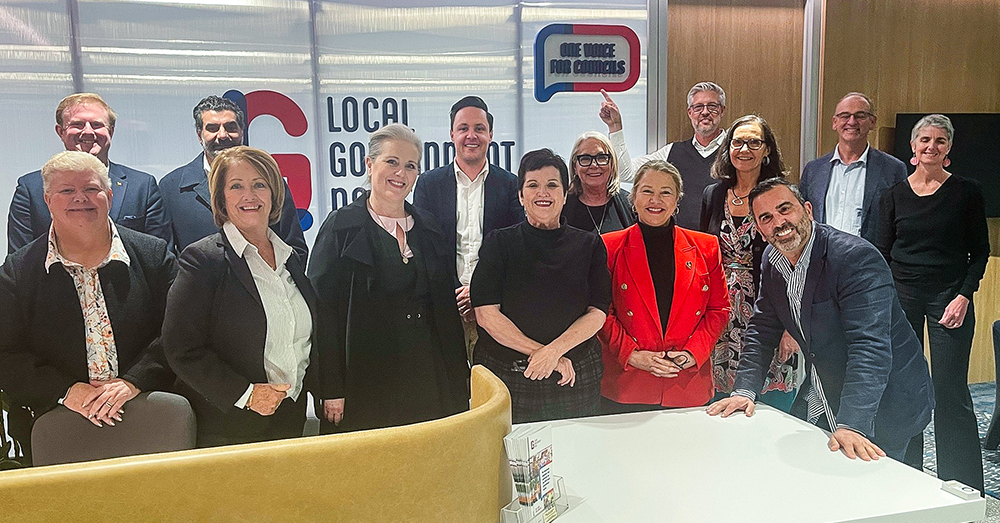
The LGNSW Board in our new-look reception area, sporting LGNSW's new branding.
11 July 2023
Advocacy priorities endorsed
On Friday, the NSW Board refreshed our advocacy priorities for the remainder of 2023 and I look forward to sharing these with you soon.
First among them remains the issue of financial sustainability for local government, building on the key asks we took to all parties and candidates at the 2023 State election.
While much remains to be done, as a sector we have collectively made good progress against our key asks for financial sustainability, which include some long-standing concerns:
- Rate peg methodology
- IPART’s draft report for its review of the rate peg methodology contains a number of promising recommendations and would appear to result in rate pegs that will more accurately reflect changes in the costs NSW councils incur in providing their services and infrastructure.
- Emergency Services Levy (ESL) reform
- While incredibly disappointing that the NSW Government has elected to discontinue the ESL subsidy for 2023-24, it is promising that IPART in its draft report for the review of the rate peg methodology is recommending an explicit, council-specific adjustment to the rate peg to wholly cover the costs for ESL.
- Public inquiry into cost shifting
- The NSW Government is planning a review of the financial model for local government, and cost-shifting will certainly play a significant part of this. In committing to this review pre-election, the then Shadow Minister for Local Government noted councils had been impacted by "a decade-long practice of cost shifting" that had undermined the financial sustainability of the local government sector and placed significant strain on councils and household budgets. Our LGNSW cost shifting survey and report are nearing finalisation and will be a crucial input to this review.
- RFS mobile assets ("red fleet")
- While LGNSW has repeated its disappointment at qualified audits issued to councils that have made the professional and logical decision to recognise that RFS mobile assets are assets of the RFS, there is some light on the horizon. The NSW Opposition has introduced to parliament a notice of motion for a Bill to amend the Rural Fires Act 1997 to resolve this issue and make clear once and for all that RFS mobile assets are assets of the NSW Government for financial reporting and depreciation purposes.
- Fairness, transparency, integrity and certainty of grant funding to councils
- In May 2023 the Government Sector Finance Amendment (Grants) Act 2023 passed parliament aiming to bolster the integrity and transparency of NSW Government grant funding arrangements. The legislation will require most grant information to be made publicly available unless there is an overriding public interest against disclosure of the information.
NSW Reconstruction Authority letter
NSW Reconstruction Authority CEO Simon Draper has written to all council general managers, in the last week, advising of ongoing work on key plans: the State Disaster Mitigation Plan, local Disaster Adaptation Plans and the NSW Recovery Plan.
Helpfully, the NSW Reconstruction Authority is working to reduce the consultation burden on councils by aiming to discuss all these initiatives jointly with councils. NSW Reconstruction Authority staff will contact councils to begin this process soon.
LGNSW will also contribute to this consultation and has established a new online network for any council staff involved in emergency management and disaster recovery. Please encourage your council staff involved in any aspect of emergency management and disaster recovery to express interest in joining the network, so they can benefit from sector wide best practice and expertise.
Win – Rural and regional health
The NSW Government has announced that it has reached an agreement with the Australian Government to expand the single employer model for GPs and emergency department doctors in rural and regional NSW.
The single employer model achieves this by making it more attractive for junior doctors to enter the Rural Generalist Training Pathway. This was successfully piloted in the Murrumbidgee Local Health District in 2020.
LGNSW has long been calling for this reform, writing to the Federal Government in March 2020, recommending it to the rural and regional health inquiry in our December 2020 submission, welcoming the inquiry’s recommendation to support this reform in May 2022, and then calling on the NSW Government to implement the inquiry’s recommendations in full.
It is terrific to see this reform finally progressed and we will continue to seek improvements to rural and regional health services across NSW.
Response from Auditor-General – Audit costs
I alerted you last week that I had written to the NSW Auditor-General to express concern at the rapidly rising costs of audit fees being imposed on councils this year.
The Auditor-General has now responded to my letter, acknowledging fee increases and noting that these are commensurate with the cost to conduct audits and the Audit Office’s cost recovery model.
Councils certainly appreciate the need for robust audit practices, but audit fee increases of more than 100% this year stand in stark contrast to the local government baseline rate peg of 3.7% and are simply unsustainable.
We will continue to advocate on this matter to the NSW Government.
Sincerely,

BACK TO MAIN PAGE